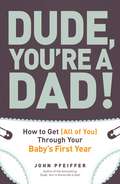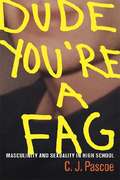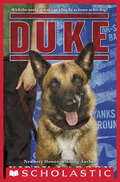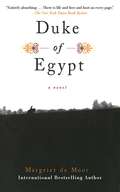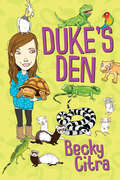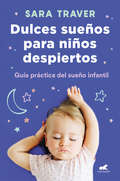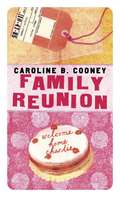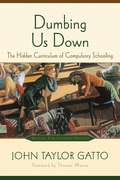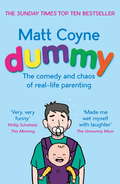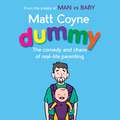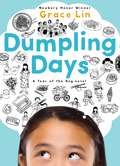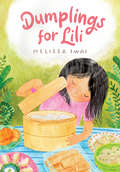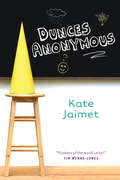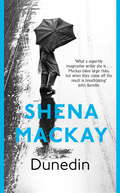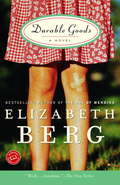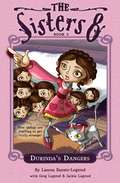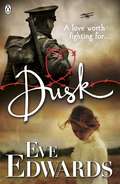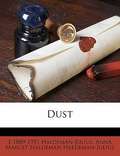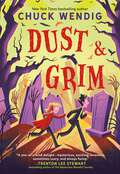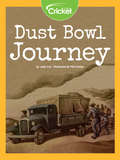- Table View
- List View
Dude, You're a Dad!: How to Get (All of You) Through Your Baby's First Year
by John PfeifferYour guide to living with your new family!Pregnancy was just the warmup. Now, it's time to get into the game and help your family through your baby's first year.From 4 A.M. feedings and visiting the pediatrician to getting back to work and hopping into bed with Mom, Dude, You're a Dad leads you through all the trials and tribulations you'll face as a new dad. Author John Pfeiffer has braved the journey not just once but three times, and will tell you exactly what changes to expect as well as what you can be doing for your baby--and your baby mama--during this time. Complete with foolproof parenting strategies for handling tricky situations, this book also braces you for the years to come, which will be full of head banging, temper tantrums, and restless days.The first twelve months are make-or-break when it comes to parenting and Dude, You're a Dad is your guide to making sure that nothing gets broken.
Dude, You're a Fag: Masculinity And Sexuality In High School
by C. J. PascoeHigh school and the difficult terrain of sexuality and gender identity are brilliantly explored in this smart, incisive ethnography. Based on eighteen months of fieldwork in a racially diverse working-class high school, "Dude, You're a Fag "sheds new light on masculinity both as a field of meaning and as a set of social practices. C. J. Pascoe's unorthodox approach analyzes masculinity as not only a gendered process but also a sexual one. She demonstrates how the "specter of the fag" becomes a disciplinary mechanism for regulating heterosexual as well as homosexual boys and how the "fag discourse" is as much tied to gender as it is to sexuality.
Duke (Dogs of World War II)
by Kirby LarsonFrom a Newbery Honor author, a boy loans his dog to the US Army during World War II in this “incisive tale of loyalty, patriotism, sacrifice and bravery” (Publishers Weekly).Hanson is determined to do his part to help his family and his country, even if it means giving up his beloved German shepherd, Duke. Hoping to help end the war and bring his dad home faster, Hobie decides to donate Duke to Dogs for Defense, an organization that urges Americans to “loan” their pets to the military to act as sentries, mine sniffers, and patrol dogs. Hobie immediately regrets his decision and tries everything he can to get Duke back, even jeopardizing his friendship with the new boy at school. But when his father is taken prisoner by the Germans, Hobie realizes he must let Duke go and reach deep within himself to be brave. Will Hobie ever see Duke, or his father, again? Will life ever be the same?“Exceptionally well-crafted and emotionally authentic.” —Kirkus Reviews
Duke of Egypt: A Novel
by Margriet De MoorFlame-haired Lucie raises horses on her father’s farm. One summer day, she meets a dark, handsome stranger named Joseph, and it is love at first sight. But their union is as improbable as their love is deep. For Joseph is a wanderer, a full-blooded gypsy for whom all of Europe is a stomping ground. Despite their cultural differences, they marry, have three children, and lead a normal life—with one exception: each spring, Joseph takes to the road to return to his other family, the gypsies, scattered to the four corners of Europe.More than a moving love story, Duke of Egypt is an exploration of gypsy identity, as revealed over centuries and across continents through the stories that Joseph tells to his wife. It is a tale of glory overshadowed always by grim reality that led to the gates of Auschwitz. Yet when the private world of Joseph and Lucie is threatened, the strength of their love and the strength of the gypsy spirit fuse to lift their story onto a shimmering new plane.
Duke's Den
by Becky CitraAmelia's world came crashing down when her parents separated and she was forced to relocate with her mother to a new part of town. But when Duke and Gabriella move into the suite downstairs with their menagerie of exotic animals, Amelia feels like she's been thrown a lifeline. Helping care for the animals gives Amelia a sense of purpose, and she's determined to keep Duke and Gabriella's secret. But eventually her mother discovers the animals and refuses to let them stay. To make matters worse, Winston, a sulcata tortoise, has fallen ill, and the medical bills are piling up. Can Amelia figure out a way to help save Winston and keep her newfound family together?
Dulces sueños para niños despiertos
by Sara TraverUna guía imprescindible, por una de las referentes en sueño infantil de nuestro país, para elaborar el plan de sueño más adecuado para tu hijo. Si las noches de tu familia se han convertido en un momento de pesadilla, si hace tiempo que olvidaste lo que significa descansar, si sientes que estás realizando un esfuerzo enorme por conseguir mejorar el sueño de tu hijo y, aun así, los despertares y desvelos se han convertido en vuestro día a día, sigue leyendo... Este libro es una guía completa que te ayudará, paso a paso, a resolver vuestros problemas de sueño, a identificar las situaciones propias y externas que pueden estar afectando y, sobre todo, a ponerles solución. Desde la calma y la empatía y atendiendo siempre a tus necesidades, así como a las de tu hijo. Encontrarás una estructura totalmente práctica, con la que podrás establecer el punto de partida y abordar desde los cambios básicos necesarios (ajustar horarios, trabajar muletillas, ordenar siestas y noches) hasta la mejor forma de acompañar a tu hijo mientras aprende a dormir de manera autónoma. Al finalizar el libro, habrás recopilado toda la información necesaria para poder definir tu propio «plan de sueño» y ponerte manos a la obra. Tus noches están a punto de cambiar para siempre.
Dumb Like Me, Olivia Potts
by Lila Perl[From the back cover:] Olivia's sister Meredith was editor of the high school literary magazine, her brother Greg had just started at Yale on a scholarship, and her mother was enrolled at the local community college. But Olivia didn't even like school. "You're just going to have to learn," she hissed in an imaginary conversation with her fifth-grade teacher, "that some of us are dumb. Dumb like me, Olivia Potts." Then Olivia made friends with a new girl, Anita Brunelli, who didn't seem all that brainy either, but who was good at figures. It was Anita who helped Olivia see the connection between her father's stolen license plates and the strange things Olivia had seen going on one afternoon in the backyard next door. But it was Olivia herself who discovered, in the scariest possible way, who was behind the thefts in the neighborhood. And Olivia, the detective, discovers that perhaps she isn't as stupid as she thought she was. Reading level 5.5, Ages 10-14
Dumbing Us Down
by Thomas Moore John Taylor GattoWith over 70,000 copies of the first edition in print, this radical treatise on public education has been a New Society Publishers' bestseller for 10 years! Thirty years in New York City's public schools led John Gatto to the sad conclusion that compulsory schooling does little but teach young people to follow orders like cogs in an industrial machine. This second edition describes the wide-spread impact of the book and Gatto's "guerrilla teaching."John Gatto has been a teacher for 30 years and is a recipient of the New York State Teacher of the Year award. His other titles include A Different Kind of Teacher (Berkeley Hills Books, 2001) and The Underground History of American Education (Oxford Village Press, 2000).
Dumbness Is a Dish Best Served Cold (Dear Dumb Diary)
by Jim BentonReturn to Mackerel Middle School with a special full-color extra-dumb diary from the New York Times–bestselling author! Life at Mackerel Middle School is as dumb as ever—but Jamie Kelly may have finally found the key to fame, fortune, and fabulousness. Together with Isabella and Angeline, she’s come up with a moneymaking idea, and it has to do with food. Everyone likes food! They’re going to be rich!The only problem? They have to come up with something that people actually want to eat.Jamie has some sophisticated thoughts on food, like, “She was manipulating us like dough. Like the sweet, delicious dough that we are. And she was baking us into the type of delicious cookies you can only get from dough like us. And she was putting sprinkles of us on top of us, and—forget it. I’m hungry. I want some cookies.”This is sure to go well.Praise for Jim Benton’s books“An amusing antic sensibility.” —Publishers Weekly“Preteens will be onboard immediately.” —Kirkus Reviews
Dumbstruck
by Mary Jane Auch Sara PennypackerWhen ten-year-old Ivy's parents disappear on the darkest night of the year, she tries to find them with the help of an orphan and her eccentric Aunt Zilpa.
Dummy: The Comedy and Chaos of Real-Life Parenting
by Matt Coyne**THE SUNDAY TIMES TOP 10 BESTSELLER**'The night before Charlie was born I had this dream. I dreamt that I was a soldier, riding into battle ... completely naked, and on the back of a large, inflatable duck.'Matt Coyne has become a hero for thousands of parents everywhere who are devoted followers of his popular blog, Man vs Baby.This is his book, and it is not your average parenting tome. It's packed with completely impractical advice for the bewildered new mum or dad - stuff you won't find anywhere else: from 'Profanity Bingo' for labour to a categorisation of various nappy disasters. But, more than that, it is the story of how becoming a parent is a kind of beautiful insanity - a thing that changes you.Above all, Dummy will keep you laughing through the exhaustion, the mystery and the madness of bringing up your own children. This is the parenting book for real people.Raves for Matt Coyne and Dummy:'A hero for dads everywhere' Daily Mirror'Very, Very funny' Phillip Schofield, This Morning'Hilarious but accurate account of finding your feet as a parent. Matt Coyne's post has struck a chord with parents from all over the world' Daily Mail 'Brutally honest rant on the reality of parenthood has taken the internet by storm' Sunday Telegraph
Dummy: The Comedy and Chaos of Real-Life Parenting
by Matt Coyne**THE SUNDAY TIMES TOP 10 BESTSELLER**'The night before Charlie was born I had this dream. I dreamt that I was a soldier, riding into battle ... completely naked, and on the back of a large, inflatable duck.'Matt Coyne has become a hero for thousands of parents everywhere who are devoted followers of his popular blog, Man vs Baby.This is his book, and it is not your average parenting tome. It's packed with completely impractical advice for the bewildered new mum or dad - stuff you won't find anywhere else: from 'Profanity Bingo' for labour to a categorisation of various nappy disasters. But, more than that, it is the story of how becoming a parent is a kind of beautiful insanity - a thing that changes you.Above all, Dummy will keep you laughing through the exhaustion, the mystery and the madness of bringing up your own children. This is the parenting book for real people.Raves for Matt Coyne and Dummy:'A hero for dads everywhere' Daily Mirror'Very, Very funny' Phillip Schofield, This Morning'Hilarious but accurate account of finding your feet as a parent. Matt Coyne's post has struck a chord with parents from all over the world' Daily Mail 'Brutally honest rant on the reality of parenthood has taken the internet by storm' Sunday Telegraph
Dummy: The Comedy and Chaos of Real-Life Parenting
by Matt Coyne**THE SUNDAY TIMES TOP 10 BESTSELLER**'The night before Charlie was born I had this dream. I dreamt that I was a soldier, riding into battle ... completely naked, and on the back of a large, inflatable duck.'Matt Coyne has become a hero for thousands of parents everywhere who are devoted followers of his popular blog, Man vs Baby.This is his book, and it is not your average parenting tome. It's packed with completely impractical advice for the bewildered new mum or dad - stuff you won't find anywhere else: from 'Profanity Bingo' for labour to a categorisation of various nappy disasters. But, more than that, it is the story of how becoming a parent is a kind of beautiful insanity - a thing that changes you.Above all, Dummy will keep you laughing through the exhaustion, the mystery and the madness of bringing up your own children. This is the parenting book for real people.Rave reviews for Matt Coyne and Dummy:'A hero for dads everywhere' Daily Mirror'Very, Very funny' Phillip Schofield, This Morning'Hilarious but accurate account of finding your feet as a parent. Matt Coyne's post has struck a chord with parents from all over the world' Daily Mail 'Brutally honest rant on the reality of parenthood has taken the internet by storm' Sunday Telegraph
Dumpling Days (A Pacy Lin Novel #3)
by Grace LinThere was no day that dumplings couldn't make better.Pacy is back! The beloved heroine of The Year of the Dog and The Year of the Rat has returned in a brand new story. This summer, Pacy's family is going to Taiwan for an entire month to visit family and prepare for their grandmother's 60th birthday celebration. Pacy's parents have signed her up for a Chinese painting class, and at first she's excited. This is a new way to explore her art talent! But everything about the trip is harder than she thought it would be--she looks like everyone else but can't speak the language, she has trouble following the art teacher's instructions, and it's difficult to make friends in her class. At least the dumplings are delicious...As the month passes by, Pacy eats chicken feet (by accident!), gets blessed by a fortune teller, searches for her true identity, and grows closer to those who matter most.
Dumplings for Lili
by Melissa IwaiAn NCTE Charlotte Huck Award Recommended Book A Chicago Public Library Best Book of the Year A heartfelt picture book celebration of food, community, and family—and little dumpling treasures from around the world. Lili loves to cook baos, and Nai Nai has taught her all the secrets to making them, from kneading the dough lovingly and firmly to being thankful for the strong and healthy ingredients in the filling. But when Nai Nai realizes that they are out of cabbage (Secret #8: line the basket with cabbage leaves!), she sends Lili up to Babcia’s apartment on the sixth floor to get some. Babcia is happy to share her cabbage, but she needs some potatoes for her pierogi. . . . What follows is a race up and down the stairs as Lili helps all the grandmothers in her building borrow ingredients for different dumplings: Jamaican beef patties, Italian ravioli, Lebanese fatayer, and more. Energized by Melissa Iwai’s engaging artwork and kinetic storytelling, Dumplings for Lili is a joyful story of sharing food, friendship, and love in all their forms.
Dunces Anonymous
by Kate JaimetJosh Johnson's mother wants him to run for class president. Josh just wants to run and hide. If only there were a club to help downtrodden eleven-year-olds escape their parents' ambitions! But since no such club exists, Josh has to invent one—he calls it Dunces Anonymous, and before he knows it, the membership is up to three. Magnolia and Wang help Josh lose the school presidential election, but that's just the beginning of the club's activities. Magnolia, pressured by her mom into trying out for the role of Juliet in the school's play, finds herself fending off the advances of an overly amorous Romeo. Wang's father has forced him to join the school chess club, but Wang desperately wants to take fencing lessons instead. As the three friends try to free Magnolia from the school play, liberate Wang from the chess club and get rid of horrible Stacey Hogarth, who has vowed to become the new president of Dunces Anonymous, they realize that they all have talents—if only their parents could see them.
Dunedin (Virago Modern Classics #258)
by Shena MackayNew Zealand, 1909. After weeks at sea the new minister, Jack Mackenzie, arrives from Scotland with his unhappy wife and children in tow. A keen naturalist, he is more enthralled by the botanical - and carnal - delights of Dunedin than in the wellbeing of his flock. In London, eighty years later, Jack Mackenzie's descendants are middle-aged, searching for a way out of their loneliness. Olive, embittered with her loveless life, steals a baby from a crowded tube; William, distraught at the death of a pupil, abandons his job as headmaster and struggles to fill his empty days. Jay Pascal, a young New Zealand vagrant of mysterious parentage arrives in London, looking for a place where he might belong.
Duped: Compulsive Liars and How They Can Deceive You
by Abby Ellin'Abby Ellin's writing is everything her fiancé pretended to be: witty, vulnerable, brave, smart, and honest.' - Michael Finkel, author of The Stranger in the WoodsIn Duped, New York Times journalist Abby Ellin explores the secret lives of compulsive liars, and the tragedy of those who trust them. Perfect for anybody who enjoyed Bad Blood and Dirty John.While leading a double life sounds like the stomping ground of psychopaths, moles, and covert agents with indeterminate dialects, plenty of people who appear 'normal' keep canyon-sized secrets from those in their immediate orbits. These untold stories lead to enormous surprises, often unpleasant ones. Duped is an investigation of compulsive liars - and how they fool their loved ones - drawing on Abby Ellin's personal experience.From the day Abby went on her first date with The Commander, she was caught up in a whirlwind. Within five months he'd proposed, and they'd moved in together. But there were red flags: strange stories of international espionage, involving Osama bin Laden and the Pentagon. Soon his stories began to unravel until she discovered, far later than she'd have liked, that he was a complete and utter fraud.When Ellin wrote about her experience in Psychology Today, the responses were unlike anything she'd experienced as a journalist. Legions of people wrote in with similar stories, of otherwise sharp-witted and self-aware people being taken in by ludicrous scams. Why was it so hard to spot these outlandish stories? Why were so many of the perpetrators male, and so many of the victims female? Was there something universal at play here?In Duped, New York Times journalist Abby Ellin explores the secret lives of compulsive liars, and the tragedy of those who trust them - who have experienced severe, prolonged betrayal - and the terrible impact on their sense of reality and their ability to trust ever again. Studying the art and science of lying, talking to victims who've had their worlds turned upside down, and writing with great openness about her own mistakes, she lays the phenomenon bare. Ellin offers us a shocking and intimate look not only at the damage that the duplicitous cause, but the painful reaction of a society that is all too quick to blame the believer.
Duped: Compulsive Liars and How They Can Deceive You
by Abby Ellin'Abby Ellin's writing is everything her fiancé pretended to be: witty, vulnerable, brave, smart, and honest' Michael Finkel, author of The Stranger in the WoodsIn Duped, New York Times journalist Abby Ellin explores the secret lives of compulsive liars, and the tragedy of those who trust them. Perfect for anybody who enjoyed Bad Blood and Dirty John.While leading a double life sounds like the stomping ground of psychopaths, moles, and covert agents with indeterminate dialects, plenty of people who appear 'normal' keep canyon-sized secrets from those in their immediate orbits. These untold stories lead to enormous surprises, often unpleasant ones. Duped is an investigation of compulsive liars - and how they fool their loved ones - drawing on Abby Ellin's personal experience.From the day Abby went on her first date with The Commander, she was caught up in a whirlwind. Within five months he'd proposed, and they'd moved in together. But there were red flags: strange stories of international espionage, involving Osama bin Laden and the Pentagon. Soon his stories began to unravel until she discovered, far later than she'd have liked, that he was a complete and utter fraud.When Ellin wrote about her experience in Psychology Today, the responses were unlike anything she'd experienced as a journalist. Legions of people wrote in with similar stories, of otherwise sharp-witted and self-aware people being taken in by ludicrous scams. Why was it so hard to spot these outlandish stories? Why were so many of the perpetrators male, and so many of the victims female? Was there something universal at play here?In Duped, New York Times journalist Abby Ellin explores the secret lives of compulsive liars, and the tragedy of those who trust them - who have experienced severe, prolonged betrayal - and the terrible impact on their sense of reality and their ability to trust ever again. Studying the art and science of lying, talking to victims who've had their worlds turned upside down, and writing with great openness about her own mistakes, she lays the phenomenon bare. Ellin offers us a shocking and intimate look not only at the damage that the duplicitous cause, but the painful reaction of a society that is all too quick to blame the believer.
Durable Goods: A Novel (Katie Nash #1)
by Elizabeth BergOn the hot Texas army base she calls home, Katie spends the lazy days of her summer waiting: waiting to grow up; waiting for Dickie Mack to fall in love with her; waiting for her breasts to blossom; waiting for the beatings to stop. Since their mother died, Katie and her older sister, Diane, have struggled to understand their increasingly distant, often violent father. While Diane escapes into the arms of her boyfriend, Katie hides in her room or escapes to her best friend's house--until Katie's admiration for her strong-willed sister leads her on an adventure that transforms her life. Written with an unerring ability to capture the sadness of growth, the pain of change, the nearly visible vibrations that connect people, this beautiful novel by the bestselling author of Open House reminds us how wonderful--and wounding--a deeper understanding of life can be.From the Trade Paperback edition.
Durinda's Dangers (The Sisters Eight #2)
by Lauren Baratz-Logsted Greg Logsted Jackie LogstedOne month after their parents' disappearance, the third-grade Huit octuplets deal with a malfunctioning refrigerator and try to win the love of the only boy in their class at Valentine's Day, while Durinda discovers her special power and gift.
Dusk
by Eve EdwardsDusk by Eve Edwards is a beautiful love story set against the brutal back drop of WWI.For all fans of Sebastian Faulks and historical fiction - this is Bird Song for young adult readers.A love worth fighting for.When Helen, a young hard-working nurse, meets aristocratic artist Sebastian, she doesn't expect to even like him, let alone fall in love. But against the troubled backdrop of wartime London, an unlikely but intense romance blossoms. And even the bloody trenches of the Somme, where they are both posted, cannot diminish their feelings for each other.But Helen is concealing a secret and when a terrible crime is committed there are devastating consequences for them both.When lives are being lost, can true love survive?Eve Edwards is an award-winning author. She lives in Oxford and is married with three children.www.eve-edwards.com
Dust
by E. Haldeman-Julius Marcet Haldeman-Julius"Dust" is a gritty novel, and a depressing read. It runs to 251 pages in this edition, in a large print using a small format page, so is not lengthy, but the plot takes in three generations of struggle of the Wade family on a Kansas farm. Emanuel and Marcet ran a farm in Girard, Kansas, so the feel for the life of a farming family is there and I suspect that the detail of the fictitious Wades is in fact fairly true to life.
Dust & Grim
by Chuck WendigFrom a bestselling author: Miss Peregrine meets The Graveyard Book in this middle grade adventure about rival siblings running a monster mortuary.Thirteen-year-old Molly doesn't know how she got the short end of the stick—being raised by her neglectful father—while Dustin, the older brother she's never met, got their mother and the keys to the family estate. But now the siblings are both orphaned, she's come home for her inheritance, and if Dustin won't welcome her into the family business, then she'll happily take her half in cash.There's just one problem: the family business is a mortuary for monsters, and Molly's not sure she's ready to deal with mysterious doors, talking wolves, a rogue devourer of magic, and a secret cemetery. It's going to take all of Dustin's stuffy supernatural knowledge and Molly's most heroic cosplay (plus a little help from non-human friends) for the siblings to figure it out and save the day...if only they can get along for five minutes.Bestselling author Chuck Wendig's middle grade debut is equal parts spooky, funny, and heartfelt—perfect for Halloween and year-round reading!
Dust Bowl Journey
by Judy CoxHenry loves his grandfather’s old pocket knife! He asks his grandfather to tell him the story of why he carved a bird into the handle. He learns the history of his family as they moved from Kansas to Oregon during the Dust Bowl and how the meadowlark became a symbol of hope during their journey.
